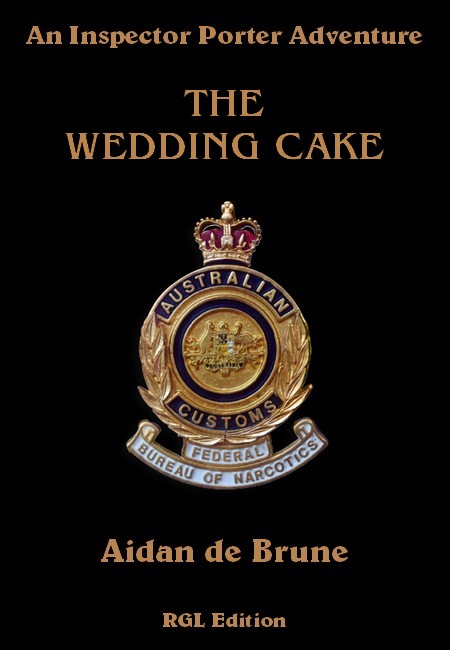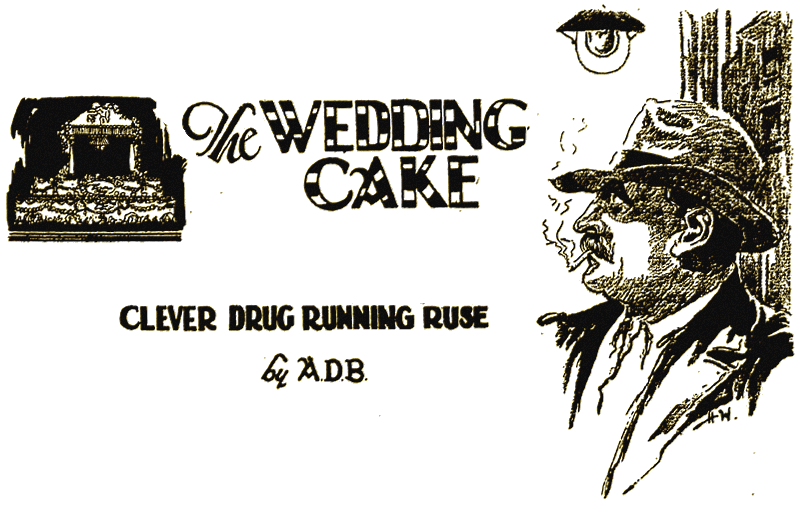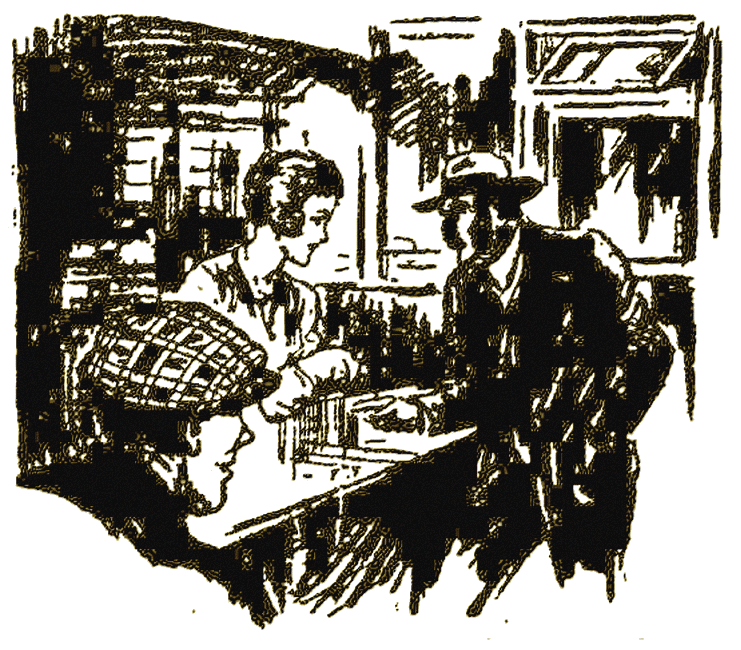
RGL e-Book Cover©
Roy Glashan's Library
Non sibi sed omnibus
Go to Home Page
This work is out of copyright in countries with a copyright
period of 70 years or less, after the year of the author's death.
If it is under copyright in your country of residence,
do not download or redistribute this file.
Original content added by RGL (e.g., introductions, notes,
RGL covers) is proprietary and protected by copyright.

RGL e-Book Cover©
In 1931 Aidan de Brune wrote a series of stories for The World's News, Sydney, featuring an Australian Customs inspector by the name of Joe Porter.
The stories were given headline-style titles and sub-titles and printed with illustrated headpieces. Some included an in-text illustration. The byline under which the stories appeared was "A.D.B." The titles and publication dates were:
• Proof of the Pudding: The Dope in the Duff (8 Jul 1931)
• The Wedding Cake: Clever Drug-Running Ruse (12 Aug 1931)
• Wiles of a Heathen Chinee: Customs Officer Innocently Smuggles Opium (2 Sep 1931)
• Beautiful Girl Victimised: Cocaine Smuggler's Ruse (23 Sep 1931)
• The Elusive Mr. Chon: Smart Smuggling Scheme (4 Nov 1931)
The RGL editions of the Joe Porter stories were built from files found in the digital newspaper archive of the National Library of Australia. Thanks and credit go to the Australian bibliophile Terry Walker for locating these stories and making them available for publication in RGL.
—Roy Glashan, 7 April 2021

INSPECTOR JOE PORTER leaned against a lamp-post in William Street. Few persons who knew the keen, smart "dope tracker" would have recognised him in the down-at-heel lounger who seemed to have no other object in life than to kill time.
A well-dressed man came down the street, passing the Inspector, and entered a pastry cook's shop close by. He tapped impatiently on the counter. A woman came out of the back room, and, as the man spoke briefly, she reached under the counter and brought out two buns. She placed them in a bag, handing it to the man. He gave her a banknote and she turned to the till to make change.
Only by a slight tenseness had the lounger in the street betrayed interest. He had seen similar incidents happen before—at that shop. Always the buns had been paid for with a bank-note. Always two twopenny buns—and a pound note changed hands.
He had searched the shop and questioned the woman. She had given her name as Violet May. Her statement had included the facts that she was not a pastry cook, although her husband had been one; that she was the occupier of the shop and that she purchased her goods from Mackenzie and Co., a wholesale firm.
Joe Porter's suspicions had been aroused when he traced Paul Scagalli to the shop; not once, but several times. Scagalli was a ship's steward on a European mail-boat. When in Sydney, he lived at a lodging-house in Bourke Street. Apparently he was fond of pastry—for, when on shore, he made daily purchases from Violet May.
The Inspector had no business hunting drug-runners in the city. That was the duty of the police drug-squad. But one day he had trailed Scagalli to the shop from the wharf. He had watched him In earnest conversation with the woman. The man had left the shop without making any purchase—and Scagalli had long been under suspicion for importing illegal drugs.
Porter had referred the matter to Sergeant Williams, of the "drug-squad." A month later Williams had declared the Inspector's suspicions regarding Violet May and her shop completely unfounded. But, Porter was not satisfied. His suspicions of Scagalli had been too well founded to be lightly laid aside. He had determined to watch, himself, during his spare time.
When the man with the buns left the shop Porter, in sudden impulse, turned and followed him. Passing the man he brushed against him roughly, deftly sweeping the bag of buns from his hand. The bag burst and one of the buns rolled into the gutter.
"Damn you! Now you can have them!" The man turned angrily, "Damned clumsy devil!"
When the man was out of sight, Porter retrieved the buns. Quickly he broke and crumbled them. Suspiciously he sniffed at them. They were entirely innocent of drugs. He dropped them into a waste receptacle.
"Too finnicky to eat a bun that dropped on a clean street?" A passing constable sneered, sarcastically. "Want it handed you on a gold plate, eh?"
Porter shrugged as he turned again to his observation post. Twice that afternoon persons entered Violet May's shop, purchasing buns and paying for them with bank-notes.
That evening, well-dressed, he entered the shop and asked for a couple of buns, offering in payment a pound note. Violet May made the change, without protest. Porter obtained a glimpse at the interior of the till. It was well stocked with coins.
"Keep a large amount of cash in the till, don't you?" he asked, casually. "Aren't you afraid of a hold-up? There was one down the road a week or so ago."
"I'm not afraid!" The woman looked at him a moment. "I've seen you before." She hesitated. "Now I remember. You searched this shop for drugs once? Didn't find any, did you? Well, what are you snooping about now for? Don't you like to see people earn an honest living?"
"An honest living—yes." The Inspector spoke significantly.
"Well?"—defiantly.
"Why do people purchase buns with bank-notes?" he asked.
"Don't know." Violet May shrugged. "I've known people give bank-notes for a sixpenny packet of cigarettes. Perhaps they want change—and that's a good way to get it."
The "dope-tracker" knew that to be true. He looked at the woman, curiously. She was good-looking, with a firm, well-rounded figure, grey-green eyes, and dull gold hair. Her expression was marred by a strange, sullen look.
"Know Scagalli?" he asked, suddenly.
"Not by name."
"Comes here quite a lot—for pastry! Middle height, black eyes and hair, round face. Always carries his hands in his trousers pockets."
Violet May shook her head. "There's dozens like that," she said.
Mrs. May, with a queer little smile, passed it over without a word.

Mrs. May, with a queer little smile, passed it over without a word.
"He's a ship steward—but a 'dope' importer," Porter continued.
"I don't deal in drugs." The woman flared to sudden anger. She snatched a book from under the counter and flung it open before the Inspector. "That's my trade. Perhaps you'd like to run through my customers; pick out those you suspect of buying drugs, and order me not to serve them."
Curious, Porter turned the pages. He quickly saw that the woman did a good trade. Her accounts were well kept and she gave short credit.
"Well?"
The Inspector shrugged. "Look here, Mrs. May," he said, impulsively. "I'm not trying to harry you. I've got suspicions and—"
"Get facts!" the woman snapped. "You and your Scagalli!"
She went into the back room. Porter waited a moment, then, as she did not reappear, he shrugged and left the shop.
The following day he resumed his watch on the shop. Late in the afternoon one of Mackenzie's carts drove up to the shop. The man carried in a large wedding-cake shell. With Violet May's assistance he lifted it into a prominent place on the shelf behind the counter, covering it with a domed glass.
A quarter of an hour later Inspector Porter entered Mackenzie and Co.'s offices, making inquiries regarding Violet May, her trade, and the order for the wedding cake.
"Only the shell—sugar, you know, Inspector," Prank Mackenzie, the owner, laughed. "Lots of them, Violet May included, ask for the sugar-shell to be loaned them a couple of days, before they want the cake. Advertisement, you know."
"How often does she order wedding cakes?" asked the Inspector.
"Very infrequently. Three or four a year."
The Inspector shrugged, as he left the office. Almost he decided to abandon the quest, yet he hated to confess he was defeated. At the back of his mind was the certainty that Violet May and Scagalli were connected and that the connection spelt—drugs. But, something held him to his watch.
He saw the cake in the shop, on the shelf, for a couple of days. Then it disappeared. The next day the carter brought it back. From the manner in which he lifted it from the cart to the shop it was evident the shell now contained the cake.
A sudden attack of influenza caused overtime work among the Customs men at the wharves. Porter found he could not now devote time to Violet May—yet he did not forget her. Three months later she was recalled abruptly to his memory.
"Telephone, for you, Joe." One of his mates called across the wharf office.
"Inspector Porter?" an unfamiliar voice spoke. "Mackenzie and Co. speaking. The pastry cooks, you know. You remember you asked me to let you know when Mrs. May gave a new order for a wedding cake."
"Yes?" The Inspector spoke mechanically.
"Our carter brought in an order from her this morning." The speaker hesitated. "I hope you've dropped your suspicions of Mrs. May—a most respectable woman, I assure you; I'd... I'd almost guarantee her!"
Porter muttered his thanks for the information and rang off. He returned to his desk, to sit, frowning thoughtfully at his papers, for long minutes. Then, with sudden decision, he swept the papers on which he had been at work in a heap.
One was a shipping list. His eyes alighted on one line and held. The Carpentia was due in Sydney Harbor in two days.
The Carpentia! That was Scagalli's ship. He suspected the man of being a drug importer. He was a friend of Violet May's; and she had ordered a wedding cake. She had ordered a wedding-cake when last Scagalli had been in Sydney!
Now he had something tangible—yet it was only a suspicion! But, suspicions, well-founded, could be turned into facts!
He watched, in his lounger disguise, Mackenzie's carter carry the sugar-shell into Violet May's shop the next day. Two or three times a day he passed the shop until the Carpentia entered port. Then the shell disappeared. That was early in the afternoon. Just before closing time, Mackenzie's carter drove up to the shop and carried in the wedding-cake.
An hour later Scagalli walked up to the shop door. The woman opened to his knock, leaving the door ajar behind him. They went to the counter and the man produced a parcel. She turned to the till and handed the man some money. Immediately Porter opened the door and entered the shop.
"I want that parcel," he demanded briefly.
Mrs. May, with a queer little smile, passed it over without a word. The Inspector unwrapped it hastily. It contained many yards of fine Maltese lace and the Customs' clearance. Scagalli watched the Inspector, a broad grin on his face.
"Satisfied?" the woman asked, with a sneer.
"I'm not!" Porter spoke in sudden temper. "You've beaten me, this time—you and that man, Scagalli; But I'll get you yet!"
He went from the shop, their laughter ringing in his ears. His last glance at the interior of the shop was towards the shelf where the wedding-cake stood, in all its glory.
Somehow he could not get that cake from his mind. He had seen the shell carried into the shop two days previous. It was due to be returned to the factory soon
Racing home, he changed into his lounger disguise; then spent some minutes at the telephone in earnest conversation with Sergeant Williams. He returned to the city, to pace slowly past the cake shop. Casually, he glanced in at the window. The cake was not on its shelf!
He had seen the cake in the shop late that afternoon. But it was not there now! Mackenzie's could not have sent for it, for their factory had closed long before he had followed Scagalli into the shop and had been fooled by the parcel of Maltese lace. Time and again he paced up and down before the shop, trying to puzzle out the solution of his problem. He knew much, but still there were links missing in his chain of evidence.
He turned and walked to Bourke Street, to take up a position from where he could keep watch on Scagalli's lodgings. Almost directly he arrived a man left the house, carrying a small case. Porter followed him down the street, contriving to knock against the case. It was empty, or nearly so. He returned to Bourke Street, to see Scagalli enter and leave the lodging-house several times during the evening—but at no time did he carry any parcel. About midnight the Inspector went home.
THE next morning he was in William Street very early. Just before eight o'clock Mackenzie's carter drove up to the shop, entered and returned to his cart, carrying the sugar-shell. As he drove off Porter signalled to a man with a bicycle on the other side of the road. The man mounted and followed the cart. A couple of men crossed the road to him and, accompanied by them, he entered the shop.
"Going to search your place again, Mrs May," he remarked, briefly.
The woman shrugged. A long search and Porter discovered, at the bottom of a well-filled dustbin, a parcel of powdered crystals. These he carried into the shop. A few minutes later Scagalli was brought in by a couple of plain-clothes constables; then followed Sergeant Williams, with Mackenzie's carter. A man followed carrying a parcel that, on opening, proved to contain drugs. In shape it would exactly fit the bottom of a sugar-shell.
"How was the joke worked?" asked Williams, curiously.
"Roughly, this way. We haven't got to the bottom yet, but we will, later. Someone gets the stuff off the boat, in conjunction with Scagalli. It's carried to his lodging. During the night he gets it into Violet May's shop. But, before Scagalli arrives in Sydney Violet May orders a wedding-cake, requesting the loan of the shell, for exhibition—that's very usual. The day after Scagalli arrives, Mackenzie's carter calls for the shell, to take to his employers to fill. On the way he either delivers the parcel of drugs he finds in the shell to some agent of Scagalli's, or distributes it to runners, himself. Of course, Violet May keeps a 'wack' of the drugs for her own trade. That's the circle—one of them will squeal when we put some pressure on them!"
Roy Glashan's Library
Non sibi sed omnibus
Go to Home Page
This work is out of copyright in countries with a copyright
period of 70 years or less, after the year of the author's death.
If it is under copyright in your country of residence,
do not download or redistribute this file.
Original content added by RGL (e.g., introductions, notes,
RGL covers) is proprietary and protected by copyright.